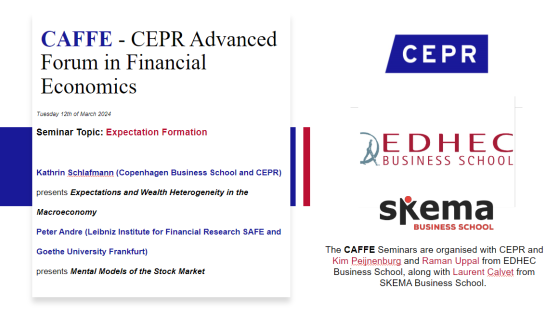


Search the site

Micro and Macro Implications of Household Behaviour and Financial Decision-Making is a cross-disciplinary seminar series covering research at the intersection of household finance, macro and labour economics. It represents a collaboration between universities and research networks and centres.
Seminars are held on Zoom each month and run for 90 minutes including a discussion panel.
Our sixth meeting will be on Friday 3rd December from 3:30pm-5:00pm GMT and will feature Hanno Lustig (Stanford and CEPR) presenting Financial and Total Wealth Inequality with Declining Interest Rates (with Daniel Greenwald (MIT), Matteo Leombroni (Stanford) and Stijn Van Nieuwerburgh (Columbia University and CEPR)). Discussion by Laurent Calvet (EDHEC and CEPR) and Florian Scheuer (University of Zurich and CEPR).
Registration Link:
https://us02web.zoom.us/meeting/register/tZMocuqqpj0vGtf7wrpNpTXhlJS9DSnRhXuE
Organisers: Richard Blundell, Michael Haliassos, Christopher Hansman, Yigitcan Karabulut, Peter Levell, Benjamin Moll, Tarun Ramadorai, and Polly Simpson.
Abstract: Financial wealth inequality and long-term real interest rates track each other closely over the post-war period. Faced with unanticipated lower real rates, households which rely more on financial wealth must see large capital gains to afford the consumption that they planned before the decline in rates. Lower rates beget higher financial wealth inequality. Inequality in total wealth, the sum of financial and human wealth and the relevant concept for household welfare, rises much less than financial wealth inequality and even declines at the top of the wealth distribution. A standard incomplete markets model reproduces the observed increase in financial wealth inequality in response to a decline in real interest rates because high financial-wealth households have a financial portfolio with high duration.